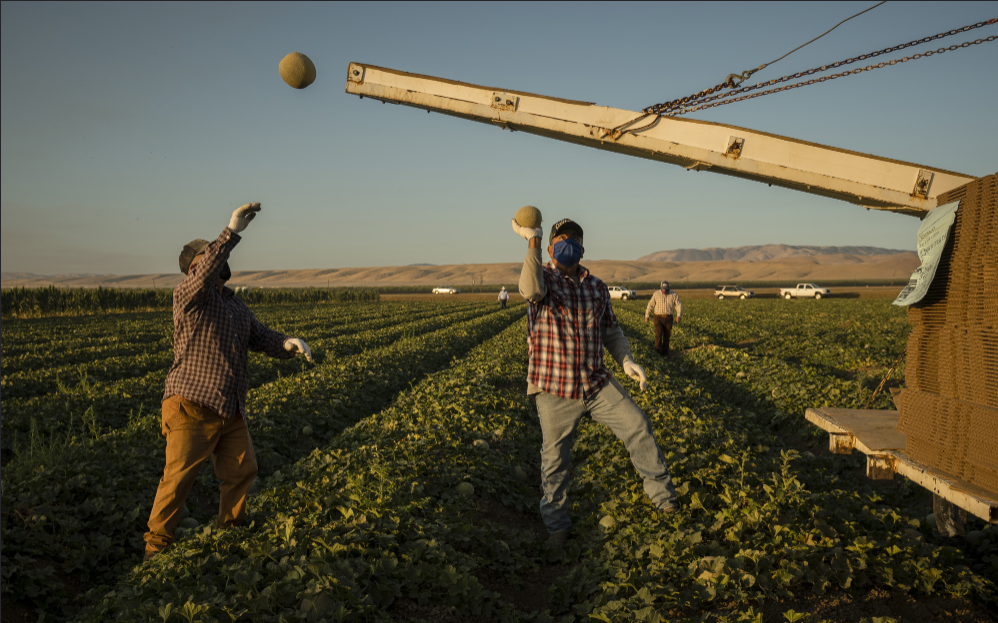Oct 6, 2021Funds for ‘climate smart’ farming added to California budget
Drought and climate loom large in the latest state budget, with programs aimed at helping farmers and ranchers with funding boosts.
A $15 billion climate response program includes $1.1 billion to support “Climate Smart Agriculture” project over two years.
“The real impact and benefit to our members from the $1.1 billion will be associated to the ag diesel engine replacement program,” said Robert Spiegel, a California Farm Bureau policy advocate. “It’s a significant investment over the next two years of about $360 million.”
The program is Funding Agricultural Replacement Measures for Emission Reductions, or FARMER.
“FARMER and other related ag vehicle replacement incentives are extremely important to our operations,” Spiegel said. “These technologies are cleaner, more efficient for our farming activities and will also improve air quality. The objective is to help farmers and ranchers replace older tractors and other diesel-powered equipment with newer models compliant with the latest emission regulations.”
The worsening drought also prompted the Legislature to allocate $5.2 billion over three years for funding for emergency drought-relief projects to secure and expand water supplies and money for implementation of the 2014 Sustainable Groundwater Management Act.
Wade Crowfoot, secretary of the California Natural Resources Agency, likened the current drought to the one that parched the state in 1976 and 1977. He noted the curtailments of water rights that began in the spring along the Russian River.
“Now the largest reservoirs in our state that are operated by the federal and state projects, which are really the backbone of our water systems, are experiencing acute shortages,” Crowfoot said in an online news conference last week. “It’s very safe to say all areas of the state will have big problems if we have another, third dry winter in a row.”
Karen Ross, secretary of the California Department of Food and Agriculture, highlighted two of her department’s programs: the State Water Efficiency and Enhancement Program, or SWEEP, and Healthy Soils.
Over the past decade, agriculture “has made a significant improvement in their use of water and water-use efficiency,” Ross said. “We’ve decreased our overall water applied rate by 14%, but we’re putting it into a more productive crop per drop, so we’ve increased our productivity by 38%.”
The budget envisions spending $100 million—half this year and half next year—to boost SWEEP, she said.
The Healthy Soils program is due to receive $165 million over two years. Ross said Healthy Soils can help sequester carbon, build up organic matter and improve soil’s water-holding capability.
“We have to start thinking about how we have plant-available moisture at the root zones to be able to survive drought,” Ross said.
Spiegel also noted the budget’s $60 million allocation for economic recovery and job growth, including technical assistance for underserved farmers looking to get started.
“We are aging farmers and ranchers,” Spiegel said. “To have the opportunity to increase the proliferation perhaps of new and beginning farmers to our industry brings with it also new understandings, new ways of doing things and new technologies.”
Smaller-scale livestock producers may have some help coming their way, thanks to a Farm Bureau-sponsored bill signed late last month.
Assembly Bill 888, carried by Assemblyman Marc Levine, D-Greenbrae, allows an exemption from animal-slaughter inspections for a mobile slaughter operator who handles slaughter and processing for a livestock owner. The meat cannot be resold commercially—that requires using a facility with a U.S. Department of Agriculture inspector on hand—but the owner may consume it or give it to friends and family.
“This allows for a more direct connection between consumers and small scale ranchers without getting bogged down at a slaughter facility,” said Katie Little, a California Farm Bureau policy advocate who works on livestock issues. She added that smaller operators “would like to use this mechanism to meet their smaller customers, provide meat to their neighbors and have more of that farm-to-fork accessibility to their local community.”
California has lost nearly half of its federally inspected meat-processing capacity over the past half-century, according to a recent report from the Food Systems Lab at the University of California, Davis. Small and midsize producers face a host of challenges. According to the report, they include lack of access to slaughter, limited capacity in cut-and-wrap facilities and concentration of market channels that make it hard for smaller producers to remain in business.
Little said many plants are booked months in advance and require a minimum herd or flock size—a number many smaller producers can’t meet.
The bill was in the works before the COVID-19 pandemic swept the world in early 2020. The pandemic added a sense of urgency, Little said, as outbreaks at meatpacking plants disrupted supplies.
In a victory for agricultural employers, Newsom vetoed AB 616, which would have allowed unions seeking to organize agricultural workplaces to conduct a “card check” vote via the collection and return of ballot cards. That provision would have allowed doing away with a secret-ballot election under the auspices of the Agricultural Labor Relations Board.
The bill’s opponents contended this could lead to coercion and intimidation of employees to sign and return ballot cards. Farm Bureau held a rally at the Capitol in early September to encourage Newsom to veto the bill, which he did Sept. 22.
“This bill contains various inconsistencies and procedural issues related to the collection and review of ballot cards,” Newsom wrote in his veto message, adding that changes to California’s agricultural-labor laws must be “carefully crafted” to protect employees’ rights to organize and bargain.
– Kevin Hecteman, California Farm Bureau Federation















